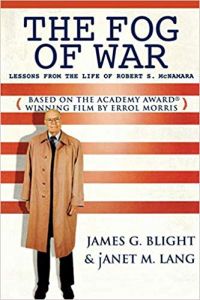
The Fog of War
Lessons from the Life of Robert S. McNamara
Recommendation
Robert S. McNamara’s first memory was of crowds celebrating the conclusion of World War I – the “war to end all wars.” Perhaps this sense that only war can stop war helped shape McNamara’s time as US Secretary of Defense, but did it endure to the end of his life? At the age of 85, McNamara sat down with filmmaker Errol Morris for a conversation about his life experiences. The many lessons that emerged from the Academy Award-winning film and this companion book by professors James G. Blight and janet M. Lang serve as a reminder of why the old trope “history repeats itself” is both a truism and remonstration.
Summary
About the Authors
James G. Blight is a professor of international relations at Brown University. janet M. Lang is an associate professor of epidemiology at Boston University and adjunct associate professor of international relations at Brown. The pair direct the Critical Oral History Project at Brown.








Comment on this summary